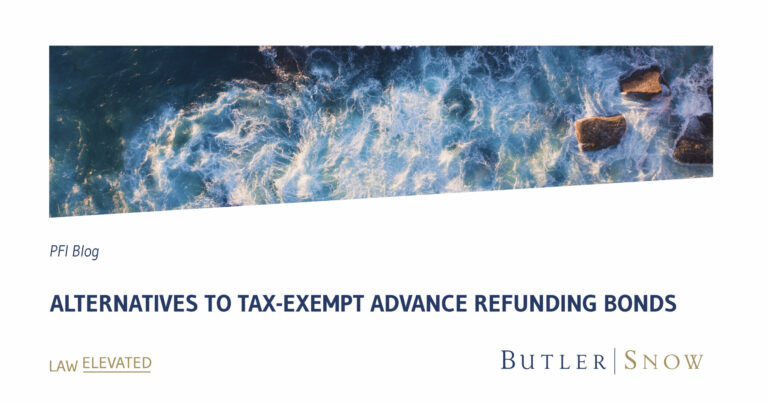As described in “Tax-Exempt Advance Refunding Bonds: History and Legislative Updates” by Caitlyn Smith Burchfield, the Tax Cuts and Jobs Act of 2017 bans the issuance of tax-exempt advance refunding bonds after December 31, 2017. An advance refunding bond issue is one where the proceeds of the issuance are used to redeem outstanding bonds on a date that is more than 90 days after the issuance of the advance refunding bonds. Current refundings (where the refunded bonds are redeemed within 90 days of issuance of refunding bonds) are still allowed.
Since the advance refunding ban took effect, bond issuers and their public finance professionals have, out of necessity, considered and used various alternatives to tax-exempt refundings:
a. Taxable Bonds. Issuing taxable advance refunding bonds has been the most common alternative to tax-exempt advance refundings. If the motivation for the refunding is interest rate savings or if state or local law requires an interest rate savings, a taxable advance refunding will be an alternative if taxable rates are less than the rate on the refunded bonds. The current low interest rate environment has permitted issuers to enjoy interest rate savings even with a taxable advance refunding. Of course, if the motivation for the refunding is to eliminate covenants or other document provisions which are troublesome, the interest rate is of less importance.
b. Forward Delivery Bonds. Tax-exempt refunding bonds may be sold by an issuer to an underwriter pursuant to a bond purchase agreement with a longer than normal delivery date. Closing on the refunding occurs within 90 days of the redemption date for the refunded bonds. For example, if the bonds to be refunded are callable on December 1, 2021, the issuer might sell refunding bonds to an underwriter in June 2021 for a closing in September 2021. However, intervening events (tax law changes, changes in state law, litigation, a rating change) pose risks since they may prevent a closing on the refunding.
c. Cinderella Bonds. A topic of interest among public finance professionals has been the concept of “Cinderella Bonds.” A “Cinderella bond” is initially issued on a taxable basis convertible to tax-exempt status upon the occurrence of some specified event. In the case of a refunding, the conversion can occur within 90 days of the redemption date of the refunded bonds. Conversion occurs only upon delivery of a bond opinion that the interest on the bonds is now tax-exempt. Intervening tax law changes may prevent conversion. In our experience, the Cinderella bond structure has been most useful in a private placement with a bank.
d. Negotiation with Existing Bondholders. Where bonds are held by a limited number of investors or if it is a bank loan, it may be possible to negotiate a change in interest rate or the waiver of call protection.
e. Tender Offer. Even if bonds are widely held, an issuer can make a tender offer to the bondholders to purchase a predetermined amount of outstanding bonds at a specified price and during a set period of time. For example, an issuer might retain a broker-dealer to purchase up to $10,000,000 of its bonds at a price in the range of 96 to 98 percent of face value.
f. Forward-Starting Swaps. An issuer may use a derivative known as a forward-starting swap to effectively lock-in interest rates at the time current refunding bonds would be issued.
i. If an issuer uses a forward-starting cash-settled swap and if rates rise between the date the swap is entered into and the date the refunding bonds are issued, the swap counterparty will make a payment to the issuer. If rates decrease, the issuer will make a payment to the swap counterparty.
ii. If an issuer issues variable rate bonds on the start date of the swap, it will have entered into a synthetic fixed rate refunding.
g. Cash Optimization. An issuer which has been accumulating cash reserves for capital projects could use that cash to defease outstanding bonds and then issue new bonds for capital purposes.
An issuer evaluating any of alternatives to tax-exempt advance refundings will confront federal tax issues, securities law questions, and state law requirements. The public finance lawyers at Butler Snow are well-versed in the legal issues with respect to these alternatives to tax-exempt advance refundings and have assisted issuers, financial advisors, and underwriters in considering these alternatives.
